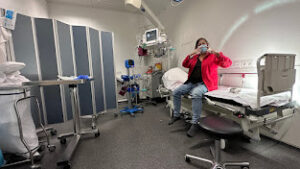Experiencing a German hospital medical emergency in a foreign country can be daunting. The complexities of healthcare systems, language barriers, and cultural differences can lead to situations that are both frustrating and frightening. This blog recounts a personal experience of a German hospital visit that went horribly wrong, providing insights and tips to help others navigate similar situations more smoothly. Whether you’re a resident or an expat, understanding the healthcare landscape in Germany is crucial to ensure your well-being. Let’s dive into this cautionary tale and learn from the mistakes made along the way.
My Scary German Hospital Visit Gone Wrong: Be Careful!
- 🩺 The Backstory: Why I Ended Up in the Hospital
- 😷 A Trip to the Emergency Room
- 💡 Lessons Learned: What to Do Differently
- 📞 Utilize Available Resources
- 🚨 Dealing with Emergency Situations in Germany
- 📝 Conclusion: A Cautionary Tale
🩺 The Backstory: Why I Ended Up in the Hospital
To understand my harrowing German hospital experience, it’s essential to know the background. Fifteen years ago, during a high school orientation camp, I encountered a traumatic event involving wasps. Blindfolded and guided into the woods, I inadvertently stepped on a wasp nest. The swarm targeted me, resulting in over 100 stings. Despite numerous tests to determine if I developed an allergy, the conclusion was that I should carry an EpiPen due to the possibility of an allergic reaction.
Fast forward to my life in Germany, where I neglected to replace my expired EpiPen, believing I was in the clear after several sting-free years. However, a few days ago, I was stung again while enjoying lunch. Initially, I thought it was a minor issue, having endured similar stings before without severe reactions. But within days, my finger began to swell alarmingly, prompting me to consider medical attention.
😷 A Trip to the Emergency Room
As the swelling worsened, I decided to visit the emergency room at a nearby hospital. I had hesitated, thinking I could manage the pain with over-the-counter antihistamines. However, when my condition deteriorated, I knew I had to seek help. The situation escalated around 3 AM when the pain became unbearable, prompting me to rush to the hospital.
Upon arrival, I conveyed my situation to the front desk. Instead of receiving empathy, I was met with judgment. The attending doctor rolled his eyes and dismissed my concerns, suggesting that I was overreacting. This experience left me feeling embarrassed and emotional, particularly since I had been in significant pain. The lack of understanding from medical professionals can be disheartening, especially during vulnerable moments.
💡 Lessons Learned: What to Do Differently
My German hospital experience serves as a valuable lesson for anyone navigating healthcare. Here are some key takeaways to avoid a similar predicament:
1. Stock Up on Essentials 🏥
It’s crucial to have a well-stocked medicine cabinet. Ensure you have:
- Antihistamines
- Ibuprofen
- Acetaminophen
- Topical creams for insect bites
Being prepared can save you from unnecessary pain and stress during an emergency. Check out DocMorris to to buy medication online.
2. Know Your Insurance Coverage 💳
If you’re living in Germany, having health insurance is non-negotiable. Understand what your policy covers and ensure it is accepted at the facilities you plan to visit. This knowledge will prevent complications and delays in treatment.
3. Establish a Family Doctor 👩⚕️
Having a family doctor (Hausarzt) can streamline your healthcare experience. This professional can provide continuity of care and is often the first point of contact for medical issues. Ensure all paperwork is filled out ahead of time to avoid delays.
4. Don’t Hesitate to Seek Help 🚑
If you feel your situation is serious, don’t wait. Seek medical attention promptly, even if it means visiting an emergency room. However, be prepared for potential judgment from medical staff and stay firm in your need for care.
5. Familiarize Yourself with Local Healthcare Options 🏥
Know the medical centers and their hours of operation in your area. In larger cities, you can find after-hours services (Notdienst) that can provide German Hospital assistance when your regular doctor is unavailable. This can reduce the need for emergency care.
📞 Utilize Available Resources
In Germany, you can call 116 117 for medical advice after hours. This service can guide you to the appropriate German hospital care and help you avoid unnecessary trips to the emergency room. Familiarizing yourself with this resource can alleviate some stress in urgent situations.
🚨 Dealing with Emergency Situations in Germany
Experiencing a medical emergency can be overwhelming. Understanding the healthcare system and being prepared can make a significant difference. Here are some additional tips to consider:
1. Keep Important Documents Handy 📄
Maintain a folder with essential medical information, including your insurance details, medical history, and any allergies. This information can expedite your treatment process.
2. Learn Basic Medical Vocabulary 🗣️
Familiarize yourself with basic German medical terms. This knowledge can help you communicate your needs more effectively in a healthcare setting.
3. Remain Calm and Assertive 😌
In stressful situations, it’s easy to feel overwhelmed. However, remaining calm and asserting your needs can help you navigate the system more effectively. Don’t be afraid to advocate for yourself.
📝 Conclusion: A Cautionary Tale
My experience with a German hospital visit gone wrong serves as a reminder of the importance of being prepared for medical emergencies. By ensuring you have the necessary supplies, understanding your insurance, and knowing where to seek help, you can navigate the healthcare system more effectively. Remember, it’s always better to be safe than sorry, especially when it comes to your health.
As expats, we may encounter unique challenges, but sharing our experiences can help others avoid similar pitfalls. I hope some of my mistakes encourages you to take proactive steps in your journey in Germany. Stay safe and prepared!
Made with VideoToBlog





